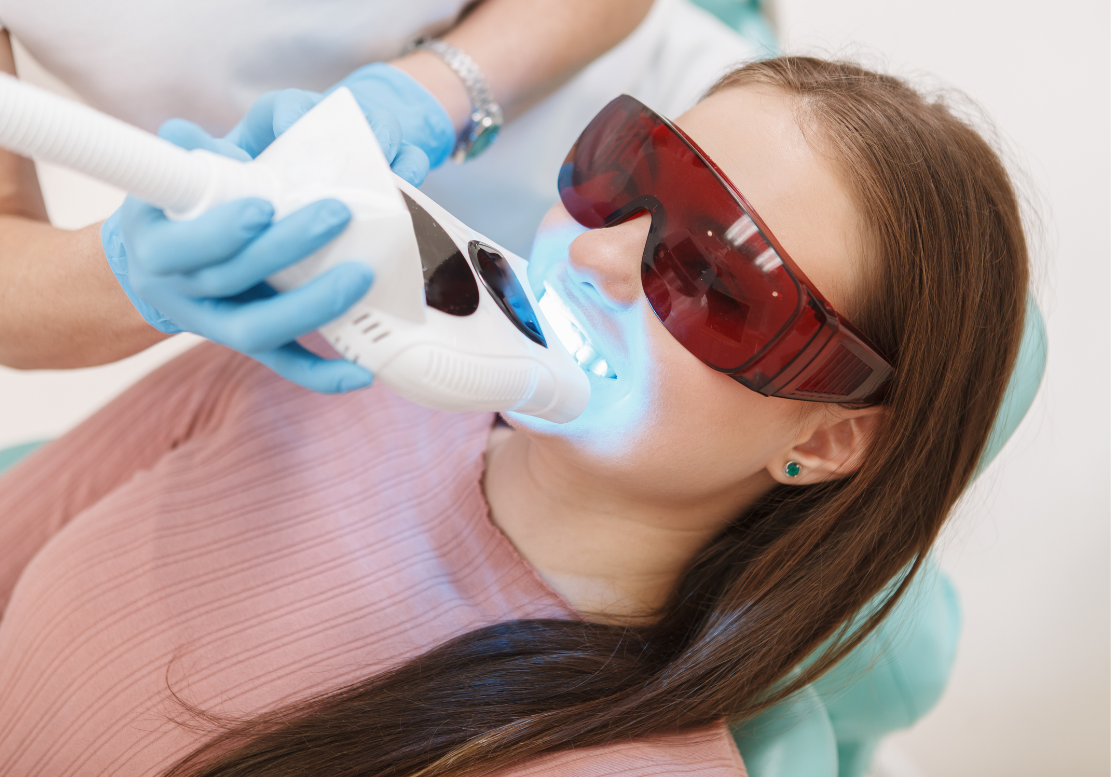I Have Sensitive Teeth. Can I Get Them Whitened?
If you have sensitive teeth, you know how much discomfort they can cause. Everyday activities like drinking a cold beverage, eating ice cream, or even brushing your teeth can become a painful experience. The idea of undergoing a teeth whitening treatment might seem daunting. But don’t worry – advancements in dental care have made sensitive teeth whitening a viable option. Let’s delve into the causes of tooth sensitivity, why traditional whitening methods may aggravate this issue, and what new technologies can help make whitening possible without added discomfort.

Understanding Tooth Sensitivity
Tooth sensitivity, also known as dentin hypersensitivity, affects millions of people. This condition occurs when the underlying layer of your teeth, called dentin, becomes exposed. Dentin is covered by enamel on your teeth’s crowns and by cementum on the roots. When these protective layers wear away due to factors like tooth decay, gum recession, or enamel erosion, the dentin’s tiny tubules (small canals) become exposed. These tubules connect to the nerve endings within the tooth, leading to the pain and discomfort associated with sensitivity.
Common Causes of Tooth Sensitivity
Several factors can contribute to tooth sensitivity, including:
- Brushing Too Hard: Overzealous brushing can wear down enamel and expose the dentin.
- Gum Recession: When gums recede, the root of the tooth becomes exposed, which isn’t covered by enamel.
- Tooth Decay and Gum Disease: Cavities and infected gums can lead to sensitive spots on your teeth.
- Acidic Foods and Drinks: Frequent consumption of acidic substances can erode enamel.
- Teeth Grinding (Bruxism): Grinding your teeth can wear down enamel and cause sensitivity.
- Certain Dental Procedures: Treatments like fillings, crowns, or professional cleanings can sometimes cause temporary sensitivity.
Why Traditional Teeth Whitening Can Exacerbate Sensitivity
Traditional teeth whitening methods, particularly those involving high concentrations of bleaching agents like hydrogen peroxide or carbamide peroxide, can exacerbate tooth sensitivity. These agents work by penetrating the enamel to break down stains. However, this process can also irritate the tooth’s nerve, especially in individuals with already compromised enamel or exposed dentin. The result is heightened sensitivity and discomfort during and after the whitening procedure.
Innovative Solutions for Sensitive Teeth Whitening
Fortunately, modern dentistry offers several innovative solutions for those with sensitive teeth who wish to achieve a brighter smile. Here’s a look at some of these advanced methods:
Desensitizing Agents: Many professional whitening systems now include desensitizing agents such as potassium nitrate and fluoride. These substances help to block the transmission of sensation from the tooth surface to the nerve, reducing sensitivity during and after the whitening process.
Customized Whitening Trays: Dentists can create custom-fitted whitening trays that ensure the bleaching agent is applied evenly and in controlled amounts. This personalized approach minimizes contact with the gums and reduces the likelihood of sensitivity.
Lower Concentration Gels: Dentists can use whitening gels with lower concentrations of bleaching agents, applying them over longer periods to achieve the desired results without causing significant sensitivity.
Laser Whitening with Controlled Heat: Laser teeth whitening involves applying a bleaching agent to the teeth and then using a laser to activate the whitening process. Advanced laser systems allow for precise control of heat and light intensity, reducing the risk of sensitivity.
Nano-Hydroxyapatite Treatments: Some modern whitening treatments incorporate nano-hydroxyapatite, a substance similar to the mineral component of enamel. This can help remineralize and strengthen the enamel during the whitening process, reducing sensitivity.
Tips for Managing Sensitivity Post-Whitening
Even with these advanced methods, some degree of sensitivity may still occur after whitening. Here are a few tips to manage and alleviate discomfort:
- Use Desensitizing Toothpaste: Toothpaste formulated for sensitive teeth can help block pain signals and protect enamel.
- Avoid Extreme Temperatures: Stick to lukewarm food and drinks for a few days after whitening.
- Maintain Good Oral Hygiene: Regular brushing with a soft-bristled toothbrush and flossing can help keep your teeth healthy and minimize sensitivity.
- Consult Your Dentist: If sensitivity persists, your dentist can recommend further treatments or desensitizing products.
In conclusion, having sensitive teeth doesn’t mean you have to forgo a brighter smile. With advancements in dental technology, sensitive teeth whitening is now more accessible and comfortable than ever. By understanding the causes of sensitivity and exploring the modern whitening options available, you can achieve the radiant smile you’ve always wanted without the added discomfort. If you have any concerns or are interested in sensitive teeth whitening, Dr. Philip Friedman is here to help you find the best solution tailored to your needs.
